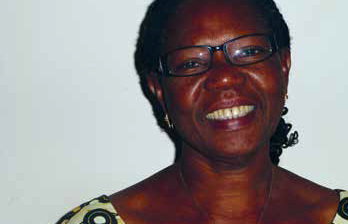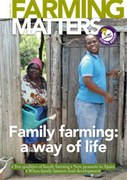
In 2003, African Heads of State made a commitment to invest at least 10% of their national budgets into agriculture by 2015. Many countries are still far from reaching this percentage. And those who have, such as Burkina Faso, are investing in biotechnology, large-scale use of chemical fertilizers, mechanisation, irrigation, pesticides and genetically modified seeds. These investments do not meet the priorities of family farmers, especially those of women. With recurrent food crises and a growing number of vulnerable people facing hunger more and more voices are calling out for a drastic change in agricultural policies.
Therefore the International Year of Family Farming in 2014 is very timely. It stresses the need for appropriate investment in sustainable family farming. What type of farming needs to be supported?
For generations, family farmers in Burkina Faso have coped with famine by innovating and diversifying food production. They protect biodiversity, soil and water and improve productivity by using agro-ecological practices such as mulching, using organic manure, building rock barriers that catch water, and cleverly managing local seeds.
Alimata is one of these farmers. She is a leader in Tiguili village, in the east of the country. The land her family granted her is largely barren and eroded. Her yield used to barely cover her family’s needs. However, with perseverance and using agro-ecological practices, she is now self-sufficient and produces enough food for her family all year round, even generating some surplus to invest in other activities.
Supporting family farmers like Alimata will both protect them and help them reach their full potential. Appropriate policies and measures should include:
- secure and easy access to resources, such as credit and land;
- support for farmers who practice agro-ecological techniques;
- access to fair markets, including adequate roads and transportation, and protection against dumping;
- better inclusion of women farmers in financial and technical support schemes, in country level planning and budgeting; and
- appropriate facilities for food storage and processing, to add value and avoid post-harvest losses.
Family farming can feed the world and strengthen resilience. The International Year of Family Farming brings hope to many small scale farmers, who are counting on firm steps at international, national and local levels.
Author
Fatou Batta is the Groundswell International Co-coordinator for West Africa and also a member of the “We are the Solution! Celebrating African Family Farming” campaign of the Alliance for Food Sovereignty in Africa (AFSA). E-mail: fbatta@groundswellinternational.org
This was Fatou Batta’s last column. The editors of Farming Matters would like to thank Fatou for her inspiring contributions.

